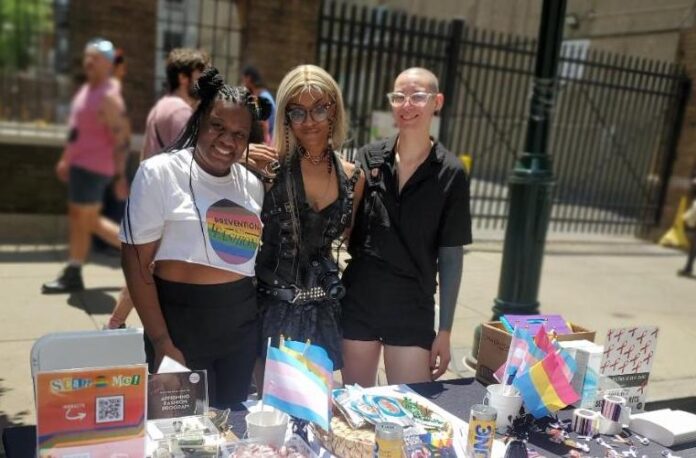
To increase resources around HIV prevention for Black cisgender and trans women who do sex work, the team at the organization Prevention Meets Fashion (PMF) devised the Sex Worker Prevention Project (SWPP). This comprehensive, multi-faceted project developed out of a series of interviews conducted with active sex workers in 2020 and 2021 to identify needs in that community. Some of those needs include safety tools, such as mace, HIV testing, condoms, clothing and more. In this case, sex work includes anything from stripping to burlesque, as well as street sex work.
“We feel like there’s a lot of resources out there like the diversion programs, but a lot of those programs tend to bring in white cis and trans women, and not necessarily Black cis and trans women, which we know have disproportionately higher rates of HIV Transmission,” said PMF Founder and Executive Director Nhakia Outland. PMF provides sexual health education and community resources through fashion, advocacy and community engagement.
Through its partnership with the Philadelphia Division of HIV Health, Outland and the SWPP team, which includes two interns, provide HIV testing kits, condoms and other pertinent info about HIV prevention to Black cis and trans women and gender nonbinary sex workers, one of the organization’s priority communities. They also provide gender-affirming items like binders and clothing for strippers through PMF’s Affirming Fashion program. The team helps make sex workers feel comfortable asking for resources while fostering a sense of community.
In addition to tangible and preventive resources, the SWPP team talks to clients who do sex work about whether they are looking for traditional work and helps them create their resumes.
“What we found is that a lot of folks couple traditional work with their sex work,” Outland said. “We help them figure out how to transition those skills to traditional work.”
During the first year of the project in 2022, Outland and the interns were mainly engaging with people who do types of sex work other than street work. Now, after roughly a year, the team is trying to improve their outreach to street sex workers, Outland said.
“We’ve been doing outreach in certain neighborhoods where we know sex work happens, and it’s also coupled with the opioid epidemic as well,” Outland said. “We’ve been taking water, snacks, condoms and information about our Sex Worker Prevention Project into different neighborhoods within Philadelphia.”
Nate Fireall is a Sex Worker Prevention intern who identifies as a nonbinary person of color, and who does full-service and online sex work.
“I feel like I relate to other workers in the sex industry who have had difficulty feeling empowered within their own gender identity as well as keeping their boundaries and consent based on how they present themselves,” Firewall said. “[I reiterate] that body autonomy should be accessible to everyone, and how do we go about that when combating gender-based violence, combating housing insecurity and harm reduction? I feel like I have a better understanding of navigating from a queer person’s point of view, as well as a person who’s really marginalized in the city of Philadelphia.”
From Fireall’s perspective, the sex work industry is either made invisible or exists only in public discourse in the context of sex trafficking or addiction, they said.
“Which is all fine,” Fireall added. “But in my sense, it’s consensual and it’s me reclaiming my right to pleasure, reclaiming my place in this world and telling myself that I don’t have to stay in one box.”
As a student in art and design at Community College of Philadelphia, Fireall also associates their sex work with art therapy. “Crossing those worlds together gives me a better voice to know why I do things and why I want to help other people,” Fireall said.
Some other general common misconceptions about sex workers, Fireall explained, are that sex workers want to be saved and are looking for someone to help them; they’re using their clients; they’re not emotionally connected to their work; they’re doing sex work solely for the sake of being lustful.
“I’ve had clients who are cis but I’ve also had queer clients who are uncomfortable in a different setting to ask for a regular hookup, but they feel safer to seek out services from me because I advertise it,” Fireall added. “There’s no discrimination. It’s very discreet. I feel like a misconception is that it’s unsafe sex, that you’re going to catch something, that you’re going to basically have to heal yourself after seeing a sex worker; when actually seeing someone like me can be a very healing experience.”
The Sex Worker Prevention Project is still growing, and the team is still learning about the needs of the sex workers who seek out PMF’s resources. Outland and the team were able to broaden their knowledge base by attending an ACLU event that overlapped with the work they do in the SWPP.
“We’re hoping to tap into those other resources to get more research specific to Philadelphia, to tap into the different areas of sex work that make sense for us in our population,” Outland said. “I would be naive not to say that our population here at PMF and the people who engage with us can look very different from who engages in the sex worker-led organizations out there.”
Nonetheless, the SWPP is filling a gap in the Philly sex worker community.
“I feel like it’s a good support system for people who want to learn about sex work,” Fireall said. “I feel like knowledge should be free and also shareable. When you are knowledgeable about people’s experiences, even if it’s not a lived experience, being open to it is empowering to yourself and will make you want to see humanity in everybody else.”
For more information about the Sex Worker Prevention Project and to reach out to the team, visit https://www.preventionmeetsfashion.org/programs/sex-education.